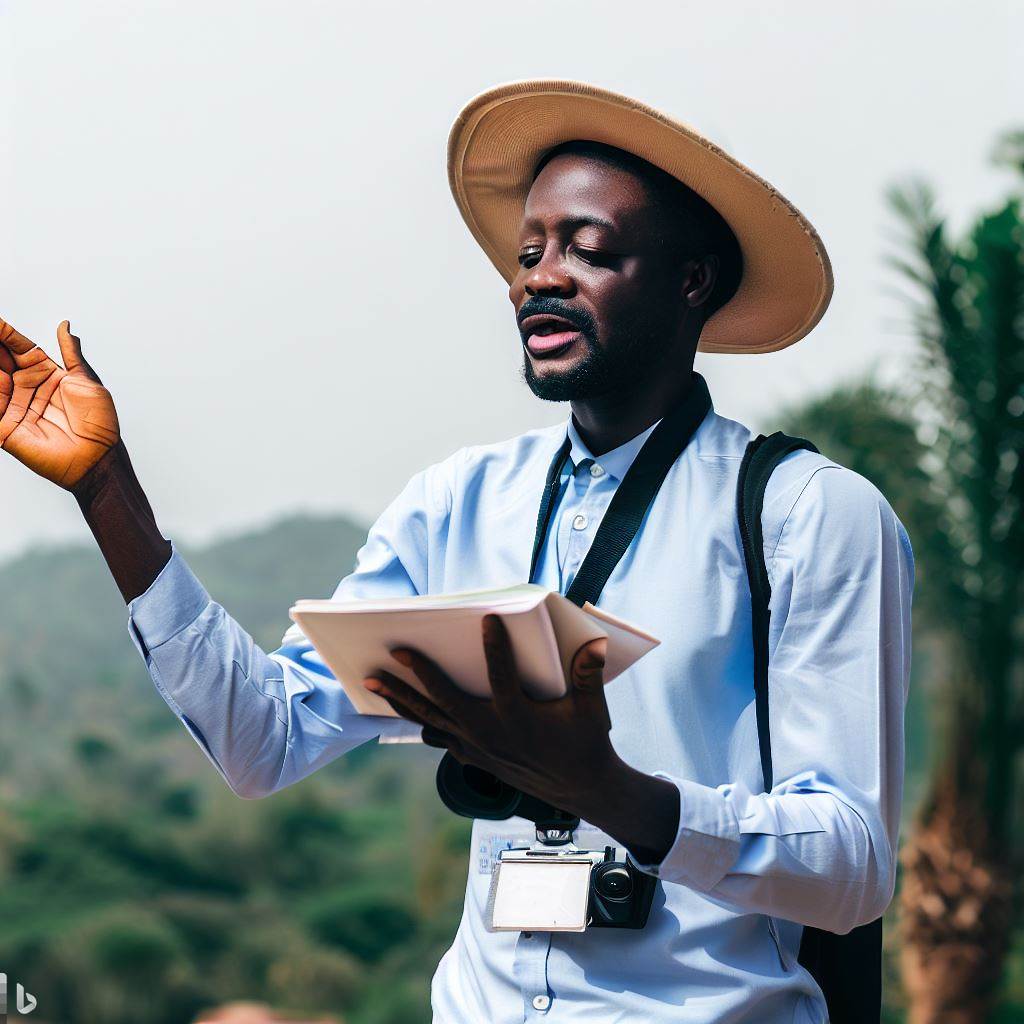Introduction
Tourism in Nigeria heavily depends on the pivotal role of tour guides. This blog post is dedicated to shedding light on the myriad challenges encountered by tour guides in this dynamic industry.
Tourism in Nigeria has grown substantially in recent years, with a diverse range of attractions and cultural experiences drawing travelers from around the world. However, the profession of tour guiding is not without its obstacles.
One of the foremost challenges is the need for continuous education and training to keep up with evolving attractions and changing visitor expectations.
Additionally, tour guides grapple with issues like inadequate infrastructure, safety concerns, and regulatory hurdles.
They often navigate complex logistics and language barriers while striving to provide enriching experiences for tourists.
This section will delve into these challenges, offering insights and potential solutions to enhance the role of tour guides in Nigeria’s burgeoning tourism sector.
Lack of Proper Infrastructure
Nigeria’s tourism industry grapples with substantial hurdles stemming from inadequate infrastructure.
Insufficient well-maintained roads and limited transportation options hinder the seamless flow of tourists to various attractions.
Firstly, the scarcity of well-kept roads obstructs access to many tourist hotspots, compromising the overall visitor experience and deterring potential travelers.
Besides road woes, the scarcity of suitable tourist facilities poses another predicament for tour guides.
Travelers anticipate clean, accessible restrooms, and comfortable accommodations. Sadly, these amenities often fall short in quality or availability, negatively impacting the overall tourist experience.
Furthermore, reaching remote tourist destinations presents a formidable challenge due to poor infrastructure.
Nigeria boasts diverse landscapes and attractions, yet reaching these remote spots proves arduous. Dilapidated roads and limited transport options complicate tour guides’ efforts to deliver a seamless experience.
A potential solution lies in increased investment in transportation and facilities development.
Government funding allocation towards road network enhancement can establish well-maintained routes to popular tourist destinations, benefiting both tourists and locals.
Simultaneously, investing in the construction and maintenance of essential tourist facilities, such as restrooms and accommodations, can elevate tour guides’ ability to serve clients, enhancing satisfaction and encouraging positive recommendations.
To tackle remote destination inaccessibility, infrastructure improvement should focus on constructing new roads or upgrading existing ones to connect isolated attractions.
Exploring alternative transportation avenues, like expanding domestic flight routes or implementing tourist-specific services, can aid tour guides in surmounting these challenges.
In fact, the challenges confronting tour guides in Nigeria, particularly related to infrastructure, significantly impact the tourism industry.
However, with increased investment in well-maintained roads, adequate tourist facilities, and improved accessibility to remote destinations, the country can provide a more enjoyable experience for both domestic and international tourists.
Inadequate Training and Certification
A. Lack of standardized training programs for tour guides
- Without standardized training programs, aspiring tour guides lack a consistent foundation of knowledge and skills.
- This leads to variations in the quality of tour guide services provided across different regions in Nigeria.
- Tourists may receive subpar experiences due to the lack of standardized training programs.
B. Inconsistencies in certification processes and requirements
- Certification processes for tour guides in Nigeria differ from state to state.
- This lack of uniformity creates confusion and inconsistency within the industry.
- It also makes it challenging for tourists to identify and trust certified tour guides.
C. Implications of untrained or uncertified guides
- Untrained or uncertified tour guides may lack the necessary knowledge to provide accurate information to tourists.
- This can result in misleading or inaccurate narratives about Nigeria’s history, culture, and attractions.
- It diminishes the overall experience for tourists and hampers the country’s tourism potential.
- Tourists rely on tour guides for their expertise, and when the guides are inadequately trained or uncertified, it erodes confidence in their services.
- This lack of trust can deter tourists from visiting Nigeria or discourage them from seeking local tour guide services.
- It ultimately hinders the growth of the tourism industry and the economic benefits it brings.
The challenges facing tour guides in Nigeria, specifically inadequate training and certification, have significant implications for the tourism industry.
The absence of standardized training programs leads to variations in the quality of tour guide services offered, while inconsistencies in certification processes create confusion and hinder trust.
Untrained or uncertified guides diminish the overall tourist experience and negatively impact the country’s tourism potential.
It is imperative for Nigeria to prioritize the establishment of standardized training programs and unify certification processes to ensure tourists receive accurate and reliable information from qualified tour guides.
By addressing these challenges, Nigeria can enhance its tourism industry, attract more visitors, and reap the economic benefits that come along with it.
Read: Nigeria’s Tour Guide Training Programs: An In-Depth Look
Language Barrier
A. Communication challenges due to Nigeria’s diverse linguistic landscape
Nigeria is a country known for its diverse ethnic groups and languages.
With over 500 different languages spoken across the country, tour guides face significant communication challenges.
B. Difficulties faced by guides to present information effectively in multiple languages
Tour guides often find it challenging to present information effectively to tourists who speak different languages.
Translating the content and ensuring accurate interpretation becomes a daunting task.
C. Importance of language skills in creating memorable experiences for tourists
Language skills are crucial for tour guides to create memorable experiences for tourists.
The ability to communicate effectively in multiple languages enhances understanding and engagement during tours.
1. Communication challenges due to Nigeria’s diverse linguistic landscape
In Nigeria, a country with diverse ethnic groups and languages, tour guides face numerous communication challenges.
With over 500 different languages spoken across the country, it becomes increasingly difficult for guides to effectively communicate with tourists.
2. Difficulties faced by guides to present information effectively in multiple languages
One of the prominent difficulties faced by tour guides is presenting information effectively in multiple languages.
Translating the content and ensuring accurate interpretation becomes a daunting task, affecting the quality of the tour experience.
3. Importance of language skills in creating memorable experiences for tourists
Language skills are pivotal for crafting unforgettable tourist experiences in Nigeria.
Effective communication in multiple languages fosters engagement and inclusivity, enriching tourists’ understanding of Nigerian culture and attractions.
Nigeria hosts visitors from diverse nations, many of whom don’t speak English, its official language. Overcoming linguistic barriers is essential for immersive, personalized experiences.
The nation’s linguistic diversity, shaped by colonial history, includes major languages like English, Yoruba, Igbo, and Hausa, along with lesser-known ones.
Tour guides must excel in multiple languages to facilitate clear, meaningful communication.
Understanding cultural nuances and expressions enhances authenticity, connecting tourists with locals and deepening insights into Nigerian life.
Proficiency in language dismantles barriers, enabling tourists to interact comfortably, ask questions, and engage in cultural activities.
Overcoming these challenges lets tour guides create memorable experiences and promote Nigeria as an enticing destination.
Read: Duties of a Casino Host: An In-Depth Look in Nigeria

Security Concerns
A. Prevalence of crime and security risks in certain areas
- Nigeria faces challenges in terms of crime rates and security risks, especially in specific regions.
- Areas that are known to have higher crime rates can pose a significant challenge for tour guides.
- Tour guides must be aware of these risks and take necessary precautions to ensure the safety of tourists.
- High crime rates in certain areas can deter tourists from visiting and exploring Nigeria’s attractions.
B. Safety measures tour guides must undertake to protect tourists
- Tour guides should conduct thorough research and gather information about the security situation in different areas.
- It is essential for tour guides to stay updated on the latest security alerts and advisories.
- Prioritizing the safety of tourists, tour guides should have emergency contact numbers readily available.
- Well-trained guides must provide tourists with detailed safety briefings, including precautions for personal belongings.
- Maintaining constant communication with local authorities can help tour guides in handling any security-related issues.
- Ensuring the availability of first aid kits, fire extinguishers, and other safety equipment during tours is crucial.
- Tour guides should encourage tourists to adhere to safety protocols and avoid risky behaviors.
C. Impact of poor security on tourism development and trust
- Poor security affects the development of tourism in Nigeria, hindering its growth potential.
- Tourists prioritize their safety when choosing destinations, and a negative perception can harm Nigeria’s tourism industry.
- Word-of-mouth and reviews from previous tourists heavily influence the decision-making process of potential visitors.
- Instances of crime and insecurity can create a lack of trust in the ability of tour guides to ensure the safety of tourists.
- With decreased trust and confidence, tourists may opt for alternative destinations, resulting in economic losses.
- The government and relevant authorities should collaborate with tour guides to address security concerns effectively.
- Implementing measures to combat crime and improve security infrastructure will enhance tourism development.
In short, security concerns present significant challenges for tour guides in Nigeria. The prevalence of crime and security risks in certain areas poses a direct threat to the safety of tourists.
Tour guides must undertake various safety measures to protect tourists, including staying informed about security situations, providing safety briefings, and maintaining communication with local authorities.
Poor security not only hinders tourism development but also impacts the trust tourists have in tour guides.
Collaboration between the government, authorities, and tour guides is essential to address security concerns and foster tourism growth in Nigeria.
Read: Sustainable Tourism: The Role of Guides in Nigeria
Lack of Government Support and Recognition
Tour guides in Nigeria face numerous challenges, with one of the most significant being the lack of government support and recognition.
This lack of support manifests in various ways, including insufficient funding for tourism infrastructure and promotion.
A. Insufficient funding for tourism infrastructure and promotion
Tourism requires strong infrastructure to thrive, including well-maintained attractions, transportation, and accommodation.
However, Nigeria has struggled to allocate sufficient funds towards developing and maintaining such infrastructure, ultimately hampering the growth of the tourism industry.
Without adequate investment, tourist attractions may lack proper facilities, making it difficult for tour guides to provide a satisfactory experience to travelers.
Furthermore, the promotion of tourism in Nigeria also suffers from insufficient funding.
Effective marketing campaigns, both domestically and internationally, are crucial in attracting tourists.
However, without proper financial backing, the Nigerian tourism industry struggles to create compelling promotional materials and reach target markets effectively.
B. Inconsistent policies regarding tourism industry regulation and licensing
The lack of consistent policies in regulating and licensing the tourism industry is another challenge faced by tour guides in Nigeria.
Inconsistencies lead to confusion and uncertainty, making it difficult for tour guides to operate within a clear framework.
Tour guides must navigate through complex bureaucratic processes, often encountering arbitrary regulations or conflicting requirements.
A well-regulated tourism industry would provide a level playing field for tour guides, ensuring fair competition and professional standards.
However, the absence of consistent and transparent regulations stifles the growth of the sector and hinders the ability of tour guides to deliver quality services.
C. Need for greater appreciation of tour guides’ role in promoting Nigerian culture and heritage
Tour guides play a crucial role in showcasing Nigerian culture and heritage to visitors. They possess in-depth knowledge and provide valuable insights into historical sites, traditions, and local customs.
Despite their importance, tour guides often go underappreciated and unrecognized for their contributions.
The government and society at large need to acknowledge and appreciate the role of tour guides in promoting Nigerian culture and heritage.
This acknowledgment can be manifested through various means, such as recognizing their professionalism, creating platforms for their voices to be heard, and providing training and development opportunities to enhance their skills.
In general, the challenges faced by tour guides in Nigeria are exacerbated by the lack of government support and recognition.
The government must address these issues by allocating sufficient funds for tourism infrastructure and promotion, establishing consistent policies for industry regulation and licensing, and fostering a greater appreciation for the vital role played by tour guides in promoting Nigerian culture and heritage.
Only through concerted efforts can Nigeria unlock the full potential of its tourism industry and ensure a thriving future for tour guides.
Read: Challenges and Rewards of a Casino Host Job in Nigeria
Overcoming the Challenges
A. Collaboration between tour guides and relevant government agencies
Efforts should be made to establish a strong partnership between tour guides and relevant government agencies.
This collaboration can involve regular meetings, sharing of information, and joint efforts to address the challenges facing tour guides in Nigeria.
B. Development of specialized training programs and certification standards
In order to overcome the challenges, it is essential to develop specialized training programs for tour guides.
These programs should cover various aspects such as customer service, cultural knowledge, communication skills, and safety measures.
Certification standards should also be set to ensure the competence and professionalism of tour guides.
C. Investments in infrastructure development and maintenance
To attract more tourists and provide a better experience for them, it is crucial to invest in infrastructure development and maintenance.
This includes improving roads, transportation systems, accommodation facilities, and tourist attractions.
Adequate funding should be allocated to ensure that these infrastructure projects are successfully implemented.
D. Strengthening community partnerships to enhance security measures
Tour guides can work together with local communities to enhance security measures.
This can involve training local people to serve as community guides, organizing neighborhood watch programs, and establishing communication networks to report any suspicious activities.
A strong community partnership will create a safer environment for both tourists and tour guides.
E. Promoting Nigeria’s tourism potential through targeted marketing campaigns
It is important to promote Nigeria’s tourism potential through targeted marketing campaigns. This can involve showcasing the country’s unique attractions, cultural heritage, and hospitality.
Social media platforms, tourism websites, and travel agencies can be utilized to reach a wider audience and attract more tourists to Nigeria.
Overcoming the challenges facing tour guides in Nigeria requires a multi-faceted approach.
Collaboration between tour guides and relevant government agencies can help in addressing regulatory issues, improving coordination, and sharing resources.
The development of specialized training programs and certification standards will enhance the professionalism and expertise of tour guides.
Publish Your Professional Profile, Business or Brand
Showcase your expertise, gain trust, and boost visibility instantly on Professions.ng.
Publish NowInvestments in infrastructure development and maintenance will contribute to creating a conducive environment for tourism.
Strengthening community partnerships will not only enhance security measures but also foster a sense of ownership and pride among local communities.
Finally, promoting Nigeria’s tourism potential through targeted marketing campaigns will increase awareness, attract more tourists, and boost the tourism industry.
By implementing these measures, the challenges facing tour guides in Nigeria can be overcome, and the tourism sector can thrive.
It is crucial to recognize the importance of the tour guide profession and provide the necessary support and resources for its growth and development.
Read: Tourism Growth in Nigeria: Opportunities for Tour Guides
Conclusion
A. Recap of the challenges faced by tour guides in Nigeria
Tour guides in Nigeria face numerous challenges that hinder their effectiveness in showcasing the country’s rich tourism potential.
These challenges include inadequate training, lack of professional accreditation, poor infrastructure, security concerns, and low wages.
B. Call for action to address these challenges and support tour guides
It is imperative that relevant authorities take immediate action to address these challenges and provide necessary support to tour guides.
This can be achieved through the implementation of comprehensive training programs, establishment of professional accreditation bodies, improvement of infrastructure, and provision of adequate security measures.
C. Emphasis on the pivotal role of tour guides in promoting Nigeria’s tourism industry
Tour guides play a pivotal role in promoting Nigeria’s tourism industry.
They are the primary interface between tourists and the country’s rich cultural heritage, historical sites, and natural wonders.
By enhancing their skills and providing them with the necessary resources, Nigeria can successfully attract and retain more tourists, consequently boosting its economy.
In the end, addressing the challenges faced by tour guides in Nigeria is essential for the growth and development of the country’s tourism sector.
By taking concrete actions to support and empower tour guides, Nigeria can maximize its tourism potential and become a sought-after destination for both domestic and international tourists.




